

Six UAL colleges and six differing approaches to digital literacies. In terms of DIAL college wide engagement CSM (POI project – BA Performance Design and Practice) and LCF (video presentation skills - MA Fashion Entrepreneurship) have had a majority of local engagement and these were through course engagement involving course staff as apposed to college engagement or support, DIAL did not have the capacity to address college or university wide engagement.
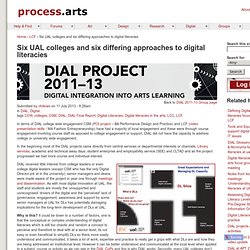
In the beginning most of the DIAL projects came directly from central services or departmental interests or channels, Library services, academic and technical away days, student enterprise and employability service (SEE) and CLTAD and as the project progressed we had more course and individual interest. DIAL received little interest from college leaders or even college digital leaders (except CSM who has the only Digital Director job at in the university); senior managers and deans were made aware of the project in year one through meetings and dissemination. Why is this? LCC, WCA, CCA and CCAD. Digital literacies and European TEL research : JISC e-Learning Blog. I was lucky enough to have a workshop accepted at ARV13 this year, a European symposium in which participants attend linked workshops on themes in TEL research.
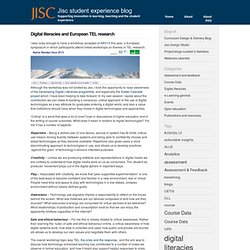
Although the workshop was not funded by Jisc, I took the opportunity to raise awareness of the Developing Digital Literacies programme, and especially the Exeter Cascade project which I have been helping to take forward. In my own session I spoke about the contribution we can make to building a conscious, critical approach to the use of digital technologies as a key attribute for graduates entering a digital world, and also a value that institutions should have when they invest in digital technologies and approaches. ‘Critical’ is a word that sees a lot of (over?) The Institute for Prospective Technological Studies. Authors: Anusca Ferrari EUR Number: 25351 EN Publication date: 8/2012 Abstract This reports aims to identify, select and analyse current frameworks for the development of digital competence.
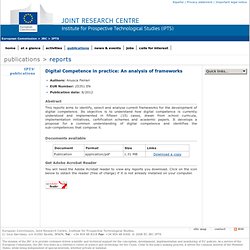
Mediendidaktik.sharedby. Enacting digital identity « catherinecronin. When we ask our students to share online — in a discussion forum within an LMS; in a wiki, course blog, Google Doc or Facebook group; on Twitter or anywhere on the open web — we are inviting not just online interaction but an enactment of each student’s digital identity.

Involvement in or resistance to online interaction is largely rooted in ideas and beliefs about identity, privacy, voice, authenticity and power. These ideas and beliefs may be articulated easily or they may previously be unreflected, but they will be invoked each time we ask students to participate online. Terms of Service; Didn't Read.
TEF764_Greenhow_Gleason%20(2) (1) Digital Literacy Projects. Resources for Data Literacy. The single most important tool I’ve found for improving Digital Literacy is Wolfram Alpha.

At your fingertips, whether on your phone, tablet, or laptop, you have access to all the world’s readily available data. All you have to do is ask. The best thing I can do to improve data literacy is to teach students (and other adults I know) to question the facts they are being quoted as gospel. Digital and Information Literacies Strategy launched. A Broader View of Digital Literacy « JISC PADDLE Project. October 4, 2012 at 9:33 am Pete At the project meeting this week we discussed the need for a broader view of digital literacy.Project members will refine the following ideas before looking again at the frameworks for specific staff and student cohorts (more to follow on these).
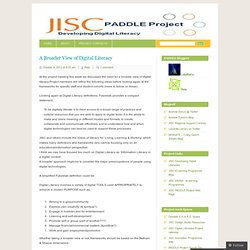
Looking again at Digital Literacy definitions, Futurelab provides a compact statement: To be digitally literate is to have access to a broad range of practices and cultural resources that you are able to apply to digital tools. It is the ability to make and share meaning in different modes and formats; to create, collaborate and communicate effectively and to understand how and when digital technologies can best be used to support these processes.
JISC and others include the notion of literacy for ‘Living, Learning & Working’ which makes many definitions and frameworks very narrow focusing only on an educational/information perspective. A simplified Futurelab definition could be: Pete. How To Make Students Better Online Researchers. I recently came across an article in Wired Magazine called “ Why Kids Can’t Search “. I’m always interested in this particular topic, because it’s something I struggle with in my middle and high school classes constantly, and I know I’m not alone in my frustrations. Getting kids to really focus on what exactly they are searching for, and then be able to further distill idea into a few key specific search terms is a skill that we must teach students, and we have to do it over and over again.
Search Education – Google. Academics' online presence - assessing & shaping visibility 2012. Information Skills for a 21st Century Scotland - Discussion Board - Meeting on 30th August. Information Literacy Community of Practice meeting held at the Scottish Government Offices, Victoria Quay on Thursday 30th August 2012, 11.30 am – Notes on the meeting.
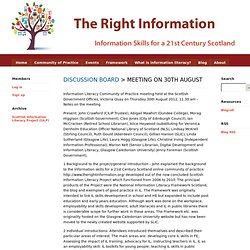
Analysing digital literacies – four headlines. One of the recent activities of the Visitors and Residents project has been the development of an analysis framework to help us to gain a deeper understanding of how our participants are engaging with technology for their learning.
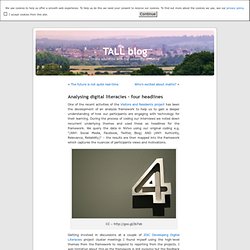
During the process of coding our interviews we noted down recurrent underlying themes and used these as headlines for the framework. We query the data in NVivo using our original coding e.g. “(ANY: Social Media, Facebook, Twitter, Blog) AND (ANY: Authority, Relevance, Reliability)” – the results are then mapped into the framework which captures the nuances of participants views and motivations. CC – Getting involved in discussions at a couple of JISC Developing Digital Literacies project cluster meetings I found myself using the high-level themes from the framework to respond to reporting from the projects. 1. 2. In the Visitors and Residents project we are exploring ‘motivation to engage’. 3. 4. Finding a Voice. WebCite query result. En-C39-05-PRE-15724-TAYIE. Teen Social Media Infographic from Common Sense Media. Supporting Academic Practice in a Digital Age · neiljohnford. Cyberwise Guide to Media Literacy. A Curated Conversation on Digital Inclusion « The Heutagogic Archives.
Digital Inclusion & Policy Overview; I previously promised to write a blog post on the practicalities and way forward relating to Digital Inclusion based on upcoming events.
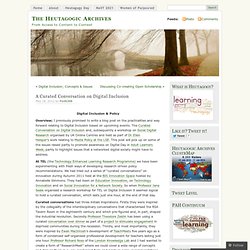
20 ways of thinking about digital literacy in higher education. Josie Fraser, social and educational technologist, Leicester City Council First define what you mean by digital literacy: The definition I most frequently use is this one: digital literacy = digital tool knowledge + critical thinking + social engagement.
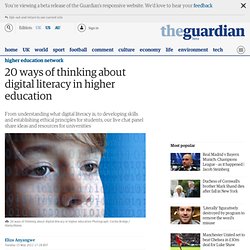
Then it's worth knowing its main characteristics: • It supports and helps develop traditional literacies• It's a life-long practice• It's about skills, competencies and critical reflection on how these skills and competencies are applied• It's about social engagement Top tips for developing the digital literacy of non-traditional students: Begin by exploring the ways in which the group are already using mobile and web based technologies. Many of them will already be engaging with tech for personal use, for example Skyping relatives, keeping in touch on Facebook or using mobile phones.
World of E's. TeachWebMaking. Web Literacy Skills: now in diagram form :) « rwxweb. Whether the digital era improves society is up to its users – that's us. Most technology designers engage in their trade to make the world a better place. Technologists love to celebrate the amazing things that people can do with technology – bridge geography, connect communities and transform societies. Meanwhile, plenty of naysayers bemoan the changes brought on by technology, highlighting issues of distraction and attention for example. Unfortunately, this results in a battle between those with utopian and dystopian viewpoints, over who can have a more extreme perspective on technology.
So where's the middle ground? One of my favourite maxims about the role of technology in society is called Kranzberg's first law. With this complexity in mind, I would like to introduce a question that I have been struggling with for the past few years: what role does social media play in generating or spreading societal fear? This question is grounded in three foundational claims: 1. Social media training resources produced by researchers at the University of Warwick. Home › Higher Education › Social media training resources produced by researchers at the University of Warwick Social media training resources produced by researchers at the University of Warwick By Sociological Imagination on • ( 5 )
Turning Students into Good Digital Citizens. 21st Century Literacy | In Print Turning Students into Good Digital Citizens Schools have always been charged with the task of producing good citizens. But how has our definition of a "good citizen" changed over the ages? The Definition of Digital Literacy. The OITP Digital Literacy Task Force released it’s official definition of digital literacy this week on the District Dispatch blog. The short definition is accompanied by a six page primer (not yet available) that provides more in-depth information. Digital literacy is the ability to use information and communication technologies to find, evaluate, create, and communicate information requiring both cognitive and technical skills. I am part of this task force and one of the reasons I was thrilled to be asked to serve is because I knew that digital literacy was a growing area of discussion not just among librarians but among policy makers and others discussing issues such as the digital divide, 21st century skills and participatory citizenship.
I also knew there was no agreed upon definition for digital literacy. Read more at District Dispatch. JISC at Association of University Administrators (AUA) 2012 « Myles Danson. One outcome of a recent JISC / AUA roundtable was to put together a JISC theme at the AUA anual conference. What does 'safe' look like in a digital age? The Job Hunt: Social Media Tips. From a marketer’s point of view, turning to social media outlets is a no-brainer. TEDx Warwick: The Essential Elements of Digital Literacies. Behind the Mask of Digital Identity. Although Strauss was writing more than two decades before the Internet became part of mainstream popular culture his quote applies equally well to the concept of how we present ourselves online through a digital identity.
Developing digital literacies in practice. Picture Credit: Scaffolding by Victoria Pickering. Digital literacy. 21st Century Literacies. The Definition of 21st Century Literacies. SCONUL Seven Pillars model: Digital Literacy lens. Computer Science is not Digital Literacy. I'm a huge fan of the current wave of enthusiasm and political will to transform the way that ICT is delivered in schools. Digital and Media Literacy: A Plan of Action.
DIGITAL LITERACY. As described in the last several postings, the challenge with the creation of a standards-based curriculum for Digital Literacy education is not too few standards to work from but too many. ThisismeCareers0-1_2.doc. Resources. JISC infoNet: e-Learning Programme support (67) Literaci.es. Digital Literacy @ University of Worcester. Research supervisors and information literacy. The ability of researchers to handle information is of vital importance. Many individuals have become adept at developing approaches and using innovative technologies to make most of the information environment, but others rather less so. Questions about how researchers develop appropriate skills, the support they receive, the training opportunities provided for them, and the take-up of such opportunities are thus highly pertinent.
Research supervisors can play a crucial role in the effective imparting of relevant skills, knowledge and understanding. But in reality, they often are not able, well-equipped or even predisposed to play such a role. RIN’s Mind the Skills Gap report pointed to the “the widespread perception that some research supervisors do not recognise the need for the types of training on offer to ‘their’ postgraduate students.
The key findings in the report include: The report sets out four broad recommendations: Attached below are the ouputs from the project: Digital literacies.wmv. Digital Literacy and Citizenship Curriculum for Grades 9-12. Digital literacy 1: What digital literacies? Publications. NetworkED: Technology in Education. Digital literacy. Professionalism in the Digital Environment (PriDE) Broadcasting ourselves « Digital Literacy @ University of Worcester. Digital Literacies for Writing in Social Media. Developing Digital Literacies Programme Start Up Meeting. Developing digital literacies.
Digital Literacies (1) – Definitions « Pete Bell. Digital Literacies Pilot Materials.